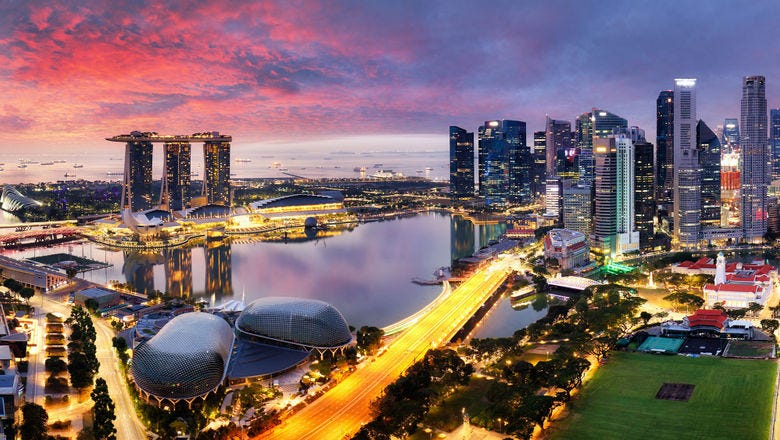Hi guys,
Hope you are well. I’m doing okay, Alhamdulillah.
I write this at 7:38 am on a chilly Sunday morning from the lobby of a hotel 1500 km away from home. My head is blank lmao. I haven't given this newsletter much thought in the past few days, partly due to running upandan and partly due to giving myself a much-needed break.
Let's get to it.
—————
I spent 6 months last year living in Singapore. It is an absolutely beautiful city-state, and it quickly gave me a feeling that it was possible for humans to build something from nothing. And that many political, economic and infrastructural challenges could be fixed, perhaps even for a country like Nigeria.
Singapore's beginnings were nothing spectacular. In the early 1960s, it was a tiny island city that was part of Malaysia - until it was kicked out (think "Ghana must go") and became independent in 1965. At this point, it's gdp per capita was about $514, at a time when Nigeria's gdp per capita was $117 and South Africa's was $584.
** side note: It is possible that one or two of you are thinking, "what is gdp per capita?". Very simply put, gdp (gross domestic product) is the economic output of a country. Basically a sum of all the goods and services that a country sees in a calendar year. And gdp per capita is the gdp of a country divided by it's population. So it gives an economic measure of how much money flows into the hands of an average citizen of a country throughout the year.
Back then, Singapore looked something like this.

Some 57 years later, Singapore's gdp per capita is $60,000 - Nigeria is $2,100 and South Africa is $5,100. For context, the UK is $40,300 and Canada is $43,200. By any metrics, Singapore is a super-rich country.
Now, it looks something like this.

Typically, I was curious about the country's history. So I picked up From Third World to First: The Singapore Story. Of course, it was a great read.
Maybe my lesson from it could have been that with the right leadership, a dedicated population, honest work and a long-term view, any country could catapult itself to success. Or that Singapore's founding father, Lee Kuan Yew, was a visionary and one of whom we shall never see again.
Or maybe my lesson could have been that all well and good for Singapore, but Nigeria could never replicate the same because we have a much larger population, disappointing leadership, and an absolutely corrupt moral system. But my lesson for today (while I do have more personal thoughts of course) is that everything is simultaneously good and bad, and people are often much more nuanced than we realize.
For example, Singapore's ruling party, the People's Action Party, has been in power for 63 consecutive years. None of the other parties have even come close. The current Prime Minister, Lee Hsien Loong, is Lee Kuan Yew's oldest son. Singapore is also an excessively strict country, where it is illegal to feed pigeons, sing in public, use a toilet without flushing, or even sell chewing gum. 😂
And there lies the problem with taking 'role models', whether as people, companies, or even countries. It is very easy to look from the outside, identify a few external metrics and determine that somebody else's path is exactly what you want. But if you were to dig a little deeper and peer beneath the surface, you would quickly find numerous things that the other person (or company or country) does that you are completely uninterested in.
So what do we do instead?
For me, two things. Specialized mentors and specific learnings.
Specialized mentors
Instead of jumping to idolize a person by making them your life mentor and advisor, you might decide to make someone an advisor/role model for only certain aspects of your life. In practice, this might mean having a career mentor, a family mentor, a spiritual mentor, an ethics mentor, a peer mentor, etc.
From one person, you might learn about navigating the professional world, and keep it at that. From someone else, you might learn only about how to build a family. From yet another person, you might find spiritual inspiration from them. Etc etc. This is because no living person is perfect, and if you are observant enough (or wait long enough), the person you have put on a pedestal will disappoint you.
Specific learnings
Another thing I think is really important, is being able to learn from somebody you do not have a direct affiliation with. Many times, we (especially those of us from underrepresented backgrounds) try to find people similar to us that we may learn from, kindred spirits if you may.
Before Chidinma applies to Amazon, she wants to speak with Sister Nkechi since she is an Amazonian that also attends Foursquare church. Or before Aishat applies to MTN, she wants to talk to Zaynab, a "sister” in Airtel that also wears the hijab.
While both of these are great, we need to be able to learn from people who do not look like us, speak like us, have similar values or any shared experiences whatsoever. I try to learn from very many people around the world, ignoring the nonsence they say (in my opinion at least) and focusing instead on what I can learn from their expertise.
This approach has been great for me, because when Chamath says nobody cares about the Uyghur genocide or when Dr. Ben Carson spends $31,500 of government money on dining room furniture, I am not too surprised.
I no kuku carry anybody for head, so everybody go dey alright.
As you begin a new week, I hope you consider freeing people from the burden of being your ‘role model’, and transition instead to gaining specific learnings in an area from people who have much-needed expertise.
** Jara content:
يَا زَكَرِيَّا إِنَّا نُبَشِّرُكَ بِغُلَامٍ اسْمُهُ يَحْيَىٰ لَمْ نَجْعَلْ لَهُ مِنْ قَبْلُ سَمِيًّا
[He was told], "O Zechariah, indeed We give you good tidings of a boy whose name will be John. We have not assigned to any before this name."
- Surah Maryam, 19:7
Have a great week. ✨



Such a great read! Keep up the good work 👍
I think it's best to pick the traits you want to emulate and "move".